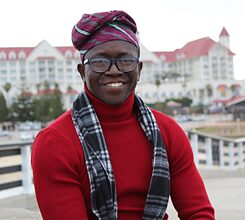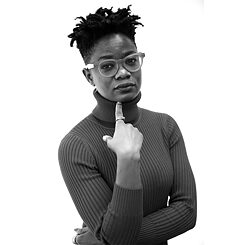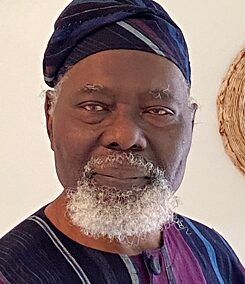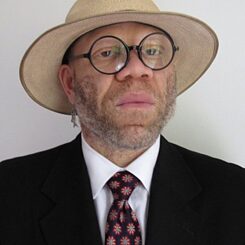The Spritual Power of Reclaiming Gods and Godesses
Òrisàs as the gods and goddesses of Yorùbá culture – with their dual essences as both divine and human – are powerful beings but are often overshadowed, or even demonized, by other spiritual belief systems and cosmologies. This is why Èsù, the trickster, messenger and god of the crossroads, has been interpreted as 'Satan' in some Christian readings. In the Yorùbá diaspora though, this has been different, with òrisàs being integrated into the spiritual dimensions of candomble and santeria.
In this conversation, we want to look deeper into the potential of òrisàs and what their stories can tell us for our contemporary days. How can we understand òrisàs as part of Yorùbá culture by learning about the oriki – the praise poetry? How can we reflect on them as an entry into the complex Yorùbá aesthetics – where character is beauty and the re-built palace is more beautiful than the one that burnt down? How can learning about Yorùbá spirituality be understood as a decolonial practice and a practice of healing?
With this first conversation in a series of three, we invite to get to know our book project "Who's Who in the Yorùbá Pantheon", that aims at, in the words of illustrator Abdulkareem Baba Aminu, "presenting the òrisàs to a whole new generation of Nigerians and non-Nigerians, inspiring pride, restoring sense of history and culture for the coming decades."
In the online and hybrid events, unfolding over the course of the year, we ask about the relevance of òrisàs in the diaspora, question hierarchies in the pantheon and explore the queer potentiality of the Yorùbá-cosmology.
All events are held in English and organized by Goethe-Institut Nigeria and iwalewabooks.
Acces via Zoom
Zoom link
Meeting ID: 939 7826 5844
Code: 757441
Panelists:
 Stephen Folaranmi
| Photo: Stary Nwaba
Stephen Folaranmi
| Photo: Stary Nwaba
Moderation:
Stephen Folaranmi (scholar, Rhodes University, Makhanda)
Stephen Folaranmi PhD is an artist and art historian in the Fine Art Department, Rhodes University, South Africa. He had taught painting, drawing and art history at Obafemi Awolowo University Ile-Ife, Nigeria. His research interests focus on Yorùbá Art Studies, African mural art and Architecture. He has published works in journals, conference proceedings and chapters in five books. He was recipient of the first Höffmann-Dozentur für Interkulturelle Kompetenz at the University of Vechta, Germany – 2008/2009 session. Stephen was recipient of the 2019 Getty CAA International travel grant, CAA 2020 International Travel grant, and 2020 ACASA Travel grant.
 Adeola Olagunju
| © Anastasiia Matsiienko
Adéola Olagunju
Adeola Olagunju
| © Anastasiia Matsiienko
Adéola Olagunju (Artist, Folkwang University, Essen, Germany)
Adéola Olagunju is an artist working with photography, video, sound and installations. Much of her artistic work has involved considerations of the Self, memory, spirituality, healing and the social landscape. Her works have been shown in festivals, museums and galleries in many countries. She was the recipient of the Seydou Keita Grand Prize Award for the best photographic creation at the 12th edition of the Bamako Encounters International Biennial for Photography in 2019, the Young Art Support Amsterdam Award in 2013 and Lagos Photo Festival Award in 2012. Olagunju was one of the selected Mentees at the 5th edition of Forecast Platform Berlin in 2020. She currently lives between Germany and Nigeria.
 Rowland Abiodun
| Photo: Lea Abiodun
Rowland Abiodun
Rowland Abiodun
| Photo: Lea Abiodun
Rowland Abiodun (Amherst College, Massachusetts, USA)
Rowland Abiodun is John C. Newton Professor of Art, the History of Art and Black Studies at Amherst College. He is the author of Yorùbá Art and Language: Seeking the African in African Art (2014); What Follows Six is more than Seven: Understanding African Art (1995); co-author of Yorùbá Art and Aesthetics (1991); and Cloth Only Wears to Shreds: Yorùbá Textiles and Photographs from the Beier Collection (2004). He is co-editor of The Yorùbá Artist: New Theoretical Perspectives on African Arts (1994). Abiodun was a consultant for, and participant in, the Smithsonian World Film, Kindred Spirits: Contemporary Nigerian Art. A former member and chair of the Herskovits Book Award Committee of the African Studies Association, Abiodun has also served on the Board of Directors of the African Studies Association and as the President of the Arts Council of the African Studies Association. In 2011, he received the Leadership Award of Arts Council of the African Studies Association in recognition of his excellence, innovation contributions and visions in the field of African and Diasporic Arts.
 Raimi Gbadamosi
| © Raimi Gbadamosi
Raimi Gbadamosi
Raimi Gbadamosi
| © Raimi Gbadamosi
Raimi Gbadamosi (scholar and artist, De Montford University Leicester & WiSER)
Professor Raimi Gbadamosi is an artist, writer and curator. He received his doctorate (2001) in Fine Art from the Slade School of Fine Art, London. He is a member of the Interdisciplinary Research Group "Afroeuropeans", University of Leon, Spain, and the "Black Body" group, Goldsmiths College, London. He is on the Editorial board of Journal of African Studies, Open Arts Journal and SAVVY, and on the boards of Elastic Residence, London and Relational, Bristol. Currently, he is a Research Associate at the Wits Institute for Social and Economic Research, Wits University, Johannesburg. His work media includes multiples, music, websites, writing and audience participation. Recent national and international shows and events include: Aardklop, Potchefstroom 2018; Words Festival, NIROX 2017, South Africa; Romulus, Rebus, Priest Gallery, Johannesburg 2017; Cemetery, Johannesburg Art Gallery, South Africa 2014/2015; Banquet, South Hill Park Bracknell, UK 2011. Publication contributions include: African Futures, Kerber 2016; Representing Enslavement and Abolition on Museums, Routledge 2011; Black British Perspectives, Sable, 2011.
Back